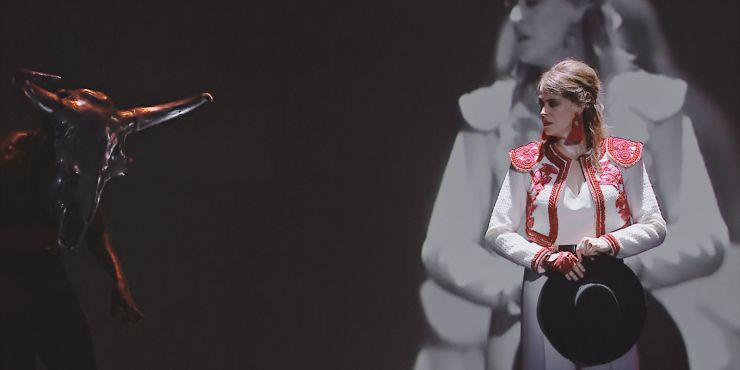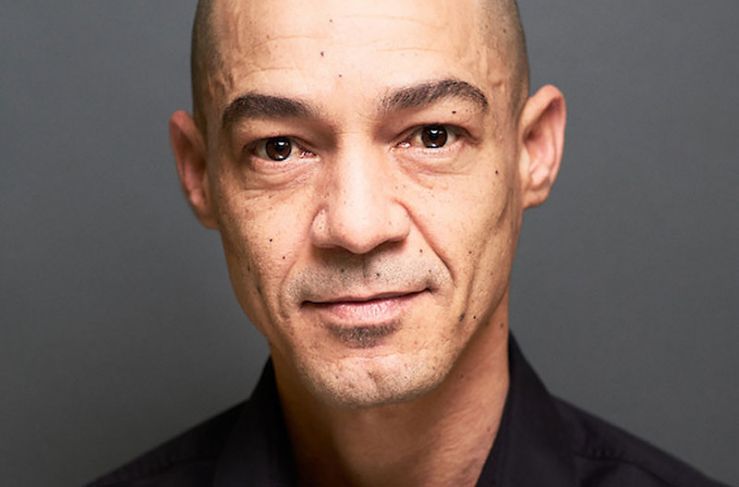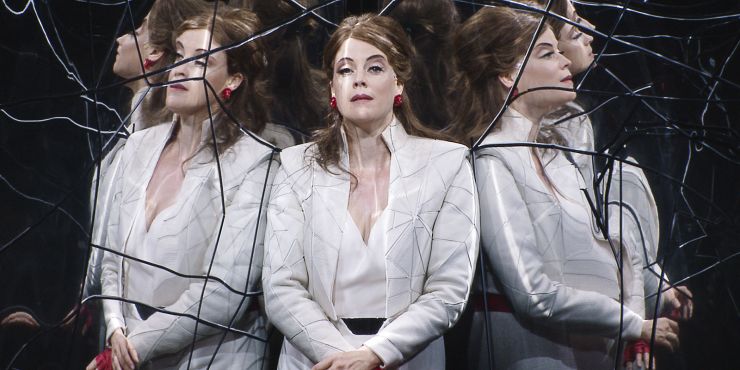CARMEN
VENZAGO - MÄRKI - FÜRHOFER
VENZAGO - MÄRKI - FÜRHOFER
Stephan Märki ist in Bern geboren und in Basel aufgewachsen. Er war zunächst als Fotograf und Journalist tätig, bevor er in München Schauspiel und Regie studierte. 1985 begann er seine Laufbahn als Theaterleiter, zunächst als Gründer des Teamtheaters in München, 1993 bis 1997 als Intendant des Hans-Otto-Theaters Potsdam, 2000 bis 2012 als Generalintendant des Deutschen Nationaltheaters Weimar.
Märki unterrichtete u.a. am Max Reinhardt-Seminar in Wien sowie an den Universitäten St.Gallen und Zürich. Als Regisseur inszeniert er inzwischen vornehmlich im Musiktheater, in Bern zuletzt George Bizets Carmen, in der nächsten Saison Tristan und Isolde von Richard Wagner.
Mario Venzago ist seit 2010 Chefdirigent und Künstlerischer Leiter des Berner Symphonieorchesters und seit 2007 Artist in Association bei der finnischen Tapiola Sinfonietta.
Weitere Stationen Mario Venzagos als Chefdirigent und Generalmusikdirektor waren das Indianapolis Symphony Orchestra, die Göteborgs Symfoniker, das Baskische Nationalorchester San Sebastian, das Sinfonieorchester Basel, die Grazer Oper und das Grazer Philharmonisches Orchester, die Deutsche Kammerphilharmonie Frankfurt (heute Bremen), das Theater und Philharmonische Orchester der Stadt Heidelberg sowie das Musikkollegium Winterthur. Von 2010 bis 2014 war er Principal Conductor der Royal Northern Sinfonia und von 2000 bis 2003 Künstlerischer Leiter des Baltimore Music Summer Fest, als Nachfolger von Pinchas Zukerman und David Zinman.
Mario Venzago dirigierte u.a. die Berliner Philharmoniker, das Gewandhausorchester Leipzig, die Orchester von Philadelphia und Boston, das London Philharmonic Orchestra, das Orchestre Philharmonique de Radio France, die Filarmonica della Scala und das NHK Symphony Orchestra. Er ist regelmäßiger Gast international renommierter Orchester wie Baltimore Symphony Orchestra, Seoul Philharmonic Orchestra, Royal Philharmonic Orchestra, Finnish Radio Symphony Orchestra, Danish National Symphony Orchestra, Göteborgs Symfoniker, Nederlands Philharmonisch Orkest, St. Petersburger Philharmoniker, Konzerthausorchester Berlin und Frankfurter Museumsorchester.
Mario Venzago konzertierte mit den berühmtesten Solisten der Welt, und Regisseure wie Ruth Berghaus, Peter Konwitschny oder Hans Neuenfels arbeiteten an seiner Seite.
Mehrere seiner CDs wurden mit internationalen Preisen ausgezeichnet, wie dem Grand Prix du Disque, dem Diapason d´or und dem Prix Edison. Die Einspielungen der Opern „Venus“ und „Penthesilea“ sowie die Aufnahme aller Chorwerke von Othmar Schoeck mit dem MDR Chor und Sinfonieorchester fanden große internationale Anerkennung und erhielten höchste Auszeichnungen, so auch sein erster Kinofilm „Mein Bruder der Dirigent“ von Alberto Venzago, der europaweit in den Kinos lief und auf DVD erschien. Im Frühjahr 2015 wurde die Zusammenarbeit zwischen Mario Venzago und dem Label CPO für das Projekt „Der andere Bruckner“ mit der Gesamtaufnahme aller zehn Bruckner Sinfonien abgeschlossen. Sowohl die von der internationalen Kritik hoch gelobten Einzelveröffentlichungen als auch die gesamte CD-Box und ein Dokumentarfilm sind bei CPO (www.jpc.de) erhältlich. Kürzlich erschien bei Sony Classical die Gesamtaufnahme der Serenaden und Sinfonien von Johannes Brahms. Für Aufsehen sorgt zur Zeit Venzagos Einspielung der von ihm vollendeten „Unvollendeten“ von Franz Schubert mit dem Kammerorchester Basel (Sony).
Philipp Fürhofer wurde in Augsburg geboren. Er studierte Bildende Kunst an der Universität der Künste in Berlin und schloss 2008 als Meisterschüler bei Hans Jürgen Diehl ab. Noch im selben Jahr begann er seine Arbeit als Bühnenbildner mit Herzog Blaubarts Burg in einer freien Produktion im Pfefferberg/Berlin. Weitere Arbeiten führten ihn an die Opernhäuser von Luzern, Amsterdam und Kopenhagen sowie an das Badische Staatstheater Karlsruhe. Mit dem Bühnenbild zu Eugen Onegin 2011 an de Nationale Opera in Amsterdam begann die Zusammenarbeit mit Stefan Herheim; 2013 entwarf er das Bühnenbild zu dessen preisgekrönter Produktion Les vêpres siciliennes am Royal Opera House Covent Garden in London. Eine enge Arbeitsbeziehung verbindet ihn ausserdem mit Holger Müller-Brandes, für den er zuletzt Bühne und Kostüme zu Macbeth am Badischen Staatstheater entwarf. 2018 folgt neben seiner Tätigkeit am Konzert Theater Bern die Ausstattung für Pelléas et Mélisandebei dem Glydebourne Festival.
Als bildender Künstler ist Philipp Fürhofer für mehrdimensionale Objekte mit Licht wie auch große Installationen bekannt, die international ausgestellt werden, so unter anderem bis vor kurzem in der Schirn Kunsthalle Frankfurt und der Galerie Judin in Berlin. Noch bis zum 29. Juli ist in der Kunsthalle München seine aufwendige Ausstellungsgestaltung zu «Du bist Faust - Goethes Drama in der Kunst» zu sehen.

Das Berner Symphonieorchester kann auf eine 140-jährige Tradition als Orchester der Schweizer Bundesstadt zurückblicken. Mit seinen rund 100 Musikerinnen und Musikern aus über 20 verschiedenen Nationen ist das Symphonieorchester neben den Sparten Musiktheater, Schauspiel und Tanz seit 2011 unter dem Dach «Konzert Theater Bern» vereint. Mit Beginn der Saison 2010/2011 trat der Schweizer Mario Venzago die Position des Chefdirigenten des BSO an. Zu seinen Vorgängern zählen unter anderem Andrey Boreyko, Dmitrij Kitajenko und Peter Maag. Namhafte Gastdirigenten wie Bruno Walter, Wilhelm Furtwängler, Karl Böhm, Herbert von Karajan sowie in jüngerer Zeit Eliahu Inbal, Sir Neville Marriner, Eiji Oue, Jun Märkl und Michael Sanderling prägten und prägen zudem das Orchester. Solistinnen und Solisten von Weltrang wie Patricia Kopatchinskaja, Frank Peter Zimmermann, Sol Gabetta, Fazil Say, Mischa Maisky oder Jean-Yves Thibaudet, sowie junge Klassikstars wie Kit Armstrong, Lise de la Salle oder Maximilian Hornung tragen dazu bei, den guten Ruf des Berner Symphonieorchesters weit über die Landesgrenze hinauszutragen. Dies führt zu regelmässigen Einladungen ins In- und Ausland, wie zuletzt nach Deutschland, England und im Mai 2017 für eine Tournee nach China.
SOPRAN
Franka Friebel, Vilislava Gospodinova, Milena Gradinarova, Jinsook Lee, Amber Opheim, Alexandra Shenker, Duck-Hee Suzuki-Yoon, Manami Takasaka, Marie-Louise Tosheva
ALT
Boriana Angelova, Adriána Kiss, Jana Larissa Essam, Vesela Lepidu, Ulrike Schneider, Natalia Staroverova, Toos van der Wal
TENOR
Mariusz Chrzanowski, Andrès Del Castillo, Bareon Hong, Sasho Jelev, Carlos Nogueira, Atanas Ouroumov, Vesselin Ouroumov, Giacomo Patti
BASS
György Antalffy-Zsiros, Pier Dalas, Iyad Dwaier, Ivaylo Ivanov, Woo Chul Jung, Chanho Lee, David Eui Bum Park, Rolf Scheider, Samuel Thompson
In Stephan Märki's interpretation, Carmen is a woman longing for death, staging sex as a weapon in a world where seduction means strength, but devotion means downfall. Love and Death are embodied by a dancer who mirrors Carmen's thoughts and emotions. Conductor Mario Venzago draws upon the “Carmen” research by musicologist Fritz Oeser, who restores Bizet's original version, giving the piece new depth and new life to the well-known arias. Philipp Fürhofer's stage design sets the singers in a mirror cabinet, creating a mise en abyme of perspectives and allusions.
Stephan Märki has staged "Carmen" as a psychological drama. He has dispensed with clichés and Spanish folklore, and portrays a female character whose complex and contradictory actions follow an inner impulse that ultimately leads her full circle – into the abyss and to her death.
Stephan Märki says, “In our reading, Carmen is hopelessly seeking true love, which she can only identify as desire, as a commodity or business transaction, or as the brief thrill of falling in love. ’Les amours de Carmen ne durent pas six mois' (’Carmen’s love affairs never last more than six months’) sings torero Escamillo, who could have been her last lover. In her short life she has experienced virtually everything, yet is never satisfied, always on the run, a seeker, a candle burning at both ends. She lacks the ability for empathy, seducing others like a female Don Juan, without ever really committing herself. She is a narcisstic woman in love only with her reflection, and she insists on being free."
At the beginning of Stephan Märki's interpretation, Carmen is about to leap to her death. The charismatic mezzo-soprano Claude Eichenberger sings and acts with an intensity that traces her character‘s every emotion. At the last moment, she backs off and is then throughout shadowed by an enigmatic figure, her alter ego, the “Joker“. The dancer Winston Ricardo Arnon from Surinam, a powerhouse of expression and wit, embodies Carmen's longing for death - seen only by her and the audience. He is also a demiurge of events, accompanying entrances and exits and pulling the strings like a puppet-master in the background. Carmen, who refuses his kiss in the opera‘s overture, will ultimately surrender to him. Death then enfolds her, in a Pietà like gesture.
During the piece, Märki’s Carmen "is flashing through the repeated patterns of her life like a person facing death”, Märki says. She meets Don José and Escamillo, two men who are poles apart. Don José ultimately kills her out of jealousy – or does Carmen kill herself? (Märki allows for both interpretations) – he is a desperate lover obsessed with the one woman he can never have. The Spanish tenor Xavier Moreno embodies the figure in all its facets: he adores Carmen and crawls into her lap like a child with his mother. He worships her like a goddess, submitting to her in a frenzy of love and torment.
The baritone Jordan Shanahan plays Escamillo, portraying him as a champion. He is like a pop star, bestowing money and blowing kisses, yet in his few encounters with Carmen he shows a touching masculine tenderness. He is the one who could have been Carmen’s equal. With the Joker, who mutates into the bull, Märki shows that both are connected by the theme of death.
A thrilling chamber play unfolds on stage. Märki's characters are singing actors in an archetypal drama; no clichéd operatic gesture spoils the authenticity of the experience. Märki's second female character, Micaëla, sung by the enchanting soprano Elissa Huber, is truly Carmen‘s equal. Far from being a shy country bumpkin, she is a woman who fights for the love of Don José and she quickly sees through Carmen‘s shenanigans. Their encounter culminates in a passionate kiss with which Carmen seeks to conquer Micaëla, but Micaëla sacrifices neither her pride nor her strength. In Märki's vision Carmen and Micaëla appear like the light and the dark side of womanhood; he leaves no doubt as to who is the true lover in this drama of fatal encounters.
By stripping away layer after layer of Carmen`s and the other protagonists’ characters, the director exposes the motives of their actions and moods and penetrates their innermost being. He reveals the fascination of this spectacular opera, whose popular arias are often submerged in folksy kitsch. Märki uses Prosper Mérimée's novella as a basis for his direction, since it outlines the characters more clearly than Henri Meilhac’s and Ludovic Halevy’s libretto.
Mario Venzago has arranged the score following the original version of "Carmen" according to Fritz Oeser's research. He and Märki delete the recitatives and most of the dialogue, their interpretation condensing the opera to its essence. Carmen's famous seduction aria "L'amour est enfant de Bohème, il n'a jamais connu de loi" ('Bohemian love follows no rules') has a merciless end in Bizet's original version: "Si tu ne m'aimes pas, je t'aime – mais si je t'aime, tant pis pour toi!" ('if you don't love me, I love you – but if I love you, it's a pity for you'). Ruin is pre-programmed in Bizet's original version of the opera, whereas the second, more densely orchestrated version leaves the ending open: "mais si je t'aime, prends garde à toi" ('...but if I love you, you better take care').
Märki and Venzago pose questions that challenge the viewer as an active participant: Is Carmen a courageous woman who defends her freedom and would rather die than surrender to the male desire that tries to cage her? They show Carmen's vulnerability, which she fears more than death, both musically and with visual images that burn themselves into the minds of the audience. Märki brings psychological motives into play. In his staging, the chorus of ragamuffins is conjured from Carmen’s memory: the boys are a phalanx of little beauty princesses, as Carmen once was – a little girl who learned at an early age how to please others, and how to compete and win. Carmen has to emerge victorious from every emotional encounter. She must be the one to teach all others to fear her.
Eros is not always bound to Thanatos but can be quite cheerful, as shown in the delightful smuggler’s quintet in the third Act (with Lilian Farahani, Eleonora Vacchi, Andries Cloete and Nazariy Sadivskyy as the band of robbers): charming and cheeky and highly erotic, the smugglers compete for Carmen's favour.
Philipp Fürhofer's stage design creates a space in which complex character direction and the rapid shifts between solo moments and choral scenes can unfold: the dominant motif is a vast mirror, as if the director and the set designer want to say that all of us are just like Carmen and Don José. And so Carmen picks out a spectator and hands him the "magic flower", her red glove. Even here the death joker playfully guides her hand. Don José rises in astonishment, looks around him, as if uncertain that he meant him - and then follows Carmen onto the stage, and to his doom. BETTINA EHRHARDT


Claude Eichenberger wurde in der Schweiz geboren, studierte Gesang in Bern und war Mitglied im Opernstudio des Opernhauses Zürich. Sie gastierte beim Opernfestival Avenches sowie an der Staatsoper Berlin. Seit 2006 ist sie Ensemblemitglied in Bern und sang hier u.a. Orlowski in Die Fledermaus, Dorabella in Così fan tutte, Försterin / Gastwirtin in Das schlaue Füchslein, Komponist in Ariadne auf Naxos, Mrs. Sedley in Peter Grimes, La Haine in Armide, 3. Dame in Die Zauberflöte, Herodias in Salome und Messagera / Proserpina in L’Orfeo sowie Judith in Herzog Blaubarts Burg in der Großen Halle der Reitschule Bern. 2010 war sie mit der Titelpartie in Carmen beim Festival Murten Classics zu erleben. Am Cantiere Internazionale d’Arte in Montepulciano sang sie erneut den Komponisten in Ariadne auf Naxos. Zuletzt interpretierte sie in Bern Ortrud in Lohengrin, Ježibaba in Rusalka, Jitsuku Honda in Hanjo, Marcellina in Le nozze di Figaro, Marthe Schwerlein in Faust, Venus in Tannhäuser, Mrs. Grose in The Turn of the Screw, Magda in der Uraufführung von Xavier Dayers Alzheim, Madame Flora in The Medium und 2018 die Titelfigur in Bizets Carmen.

Xavier Moreno, geboren in Barcelona, studierte am dortigen Conservatori Superior del Liceu Gesang, Klavier und Chorleitung. Er begann seine Karriere im Ensemble des Nationaltheaters Mannheim, wo er sich ein bemerkenswertes Repertoire erarbeitete. Seitdem führten ihn Engagements u.a. an die Opéra Bastille Paris, an das Teatre del Liceu Barcelona, das Teatro Real Madrid, die Königliche Oper Kopenhagen, Teatro Solís Montevideo, nach Budapest, Bern, Split, Riga, Tel Aviv, Seoul, Limoges sowie an die Oper Köln, die Oper Leipzig, die Staatsoper Hannover, die Staatstheater Wiesbaden, Saarbrücken und Darmstadt sowie u.a. an die Opernhäuser in Halle, Dortmund, Augsburg, Mainz und zur Ruhrtriennale.
Zu seinem Repertoire zählen seitdem u.a. die Titelpartien in Verdis Don Carlo sowie Massenets Werther, Alvaro in La forza del destino, Cavaradossi in Tosca, Don José in Carmen, Pinkerton in Madama Butterfly, Edgardo in Lucia di Lammermoor, Rodolfo in La Bohème und Alfredo in La Traviata.
Im Konzertbereich erstreckt sich sein Repertoire von Verdis Requiem über Puccinis Messa di Gloria, Beethovens Christus am Ölberge, Dvořáks Stabat Mater und Requiem bis Elgars Dream of Geronitus. Hiermit konzertierte er u.a. in der Suntory Hall in Tokyo, am Konzerthaus Berlin, an der Philharmonie Köln, in Bonn und an der Tonhalle Zürich.

Elissa Huber ist gebürtig aus Mosbach (Baden) und absolvierte ihr Gesangsstudium an der Bayerischen Theaterakademie August Everding in München. Sie wurde in zahlreichen Wettbewerben ausgezeichnet, u.a. beim Bundeswettbewerb Gesang in Berlin und bei Jugend Kulturell in Hamburg. Ihr Bühnendebüt im Bereich Musical gab sie am Deutschen Theater München. Weitere Engagements führten sie an das Operettenhaus Hamburg, ins Theater 11 Zürich sowie europaweit auf Tournee. 2015 wechselte Elissa Huber in das klassische Sopranfach und schloss ihren Masterstudiengang in Musik, Performance und Gesang mit Schwerpunkt Konzert an der Zürcher Hochschule der Künste ab. Daraufhin wurde sie an das Opernstudio des Mailänder Teatro alla Scala engagiert, wo sie unter der Leitung von Peter Stein und Ádám Fischer ihr Opern-Debüt als Erste Dame in Die Zauberflöte gab. Mit der Tanzproduktion Callas kam sie vergangene Saison erstmals ans Konzert Theater Bern. Am Theater für Niedersachsen sprang sie kurz darauf als Agathe in Der Freischütz ein. Im Sommer 2017 erreichte sie das Semifinale des Belvedere Wettbewerb in Moskau und kam somit weltweit unter die letzten 50. Seit vergangener Saison ist sie festes Ensemblemitglied bei Konzert Theater Bern und war bereits als Donna Elvira in Don Giovanni sowie als Micaëla in Carmen auf der Bühne zu erleben.

Jordan Shanahan wurde auf Hawaii geboren und stand bereits in über 50 Rollen auf der Bühne, unter anderem in der Metropolitan Opera of Chicago, am Teatro di San Carlo in Neapel, an der Santa Fe Opera oder der holländischen Nationaloper in Amsterdam. Sein Repertoire umfasst Barockopern Cavallis und Händels, Rollen des Standardrepertoires wie Figaro sowohl in Il barbiere di Siviglia als auch in Le nozze di Figaro, Escamillo in Carmen oder Enrico in Lucia di Lammermoor. In den vergangenen Spielzeiten wandte er sich vermehrt dramatischen Rollen zu und war als Barnaba in La Gioconda, Alfonso in La Favorita oder als Alberich in Wagners Ring-Zyklus zu erleben. Darüber hinaus hat er mit seinen Interpretationen zeitgenössischer Opern, darunter als Protector in George Benjamins Written on Skin, auf sich aufmerksam gemacht. Jordan Shanahan ist Preisträger zahlreicher Wettbewerbe, darunter der Loren Zachary Society, der Licia Albanese Puccini Foundation, der George London Foundation und des Metropolitan Opera National Council. Bei Konzert Theater Bern war er bereits als Titelpartie in Le nozze di Figaro, als Wolfram von Eschenbach in Tannhäuser, als Conte di Luna in Il trovatore sowie als Escamillo in Carmen auf der Bühne zu erleben.

Winston Ricardo Arnon wurde 1984 in Paramaribo, Surinam, geboren und studierte Tanz an der Amsterdamse Hogeschool voor de Kunsten, ergänzt durch einen Aufenthalt an der Alvin Ailey School in New York. Erste berufliche Erfahrungen sammelte er in Projekten von Gerard Mosterd und Cecília de Lima, im Jahre 2008 stieß er zu Conny Janssen Danst in Rotterdam. Weitere Engagements führten ihn zu Project Sally sowie zu den Dansateliers Rotterdam. Seit der Spielzeit 2013.14 ist Winston Ricardo Arnon Ensemblemitglied der Tanzcompagnie Konzert Theater Bern und war dort bisher in Nanine Linnings ZERO, als Janus in Requiem, als Fabers Schatten in Felix Landerers Homo Faber, in der Titelrolle von Estefania Mirandas Othello, in Sidi Larbi Cherkaouis Faun, Tabula Rasa sowie als Joker in der Opernproduktion Carmen zu erleben.
Für das Projekt CUT – Cinema Unleashes Dance choreografierte er im Frühjahr 2014 das Stück Invisibility Would Be Preferred. Im Rahmen von Next Generation choreografierte 2017 Remote sowie 2016 und 2018 das Kooperationsprojekt mit der New Dance Academy Bern.

Young Kwon wurde in Seoul (Südkorea) geboren, studierte Gesang an der dortigen Yonsei Universität und absolvierte anschließend die Opernschule der Musikhochschule Frankfurt. Meisterkurse bei Theo Adam und Christoph Prégardien, ein Diplom an der Accademia Chigian bei Renato Bruson sowie die Liedklasse von Hartmut Holl und Mitsuko Shirai in Karlsruhe ergänzen seine Ausbildung. 2010 gewann er den Mendelssohn-Wettbewerb Frankfurt. Nach Gastauftritten in den Spielzeiten 2003 bis 2006 am Staatstheater Wiesbaden folgte ein Festengagement an der Staatsoper Hannover in den Jahren von 2006 bis 2012, wo er u.a. Banco in Verdis Macbeth oder Osmin in Die Entführung aus dem Serail sang. Es folgten Engagements am Staatstheater Erfurt, bei den Burgenfestivals Schwerin (2014) und Heidenheim (2015) sowie am Landestheater Niederbayern. Zwischen 2015 und 2017 war er als Ensemblemitglied am Theater Augsburg u.a. als Lindorf, Coppelius, Dr. Mirakel und Dapertutto in Jacques Offenbachs Hoffmanns Erzählungen, Boris Timofejewitsch Ismailow in Schostakowitschs Lady Macbeth von Mzensk und Dulcamara in Gaetano Donizettis L’elisir d’amor auf der Bühne zu erleben. Seit der Spielzeit 2017.18 ist er Ensemblemitglied am Konzert Theater Bern und war bereits als Sarastro in Die Zauberflöte für Kinder, Commendatore in Don Giovanni, Graf Karenin in Anna Karenina sowie als Ferrando in Il Trovatore und Zuniga in Carmen zu hören.

Dutch-iranian soprano Lilian Farahani studied at the Royal Conservatory in The Hague and at the Conservatory in Amsterdam, and graduated with honours from the Dutch National Opera Academy in 2015. She made her debut in France in 2017 at the Opéra National de Lorraine in Nancy under Sascha Goetzel in the role of Carolina in Il Matrimonio segreto, a role that she performed during the previous season at the Dutch National Opera in a co-production with Opera Zuid and De Nederlandse Reisopera. Her repertoire also includes Despina in Così fan tutte, Zerlina in Don Giovanni, Susanna in Le Nozze di Figaro, Luisa in Die stumme Serenade (Korngold) and Morgana in Alcina, but Lilian feels equally at home singing contemporary works. She has sung the role of Anne Frank in the opera Anne and Zef by Monique Krüs (world premiere), the Dutch premiere of Death Knocks (Christian Jost) and Jake Heggie’s cycle of Eve-songs. She also appeared in The Infernal Comedy by Michael Sturminger at the Dutch National Theatre under the direction of Theu Boermans.
On the concert podium, she has sung with the Residentie Orkest and the Netherlands Chamber Orchestra, as well as the Rotterdam Philharmonic Orchestra. She has also performed at the Prinsengrachtconcert in Amsterdam.
Lilian began her 2017.18 season as a member of the soloist ensemble at the Konzert Theater Bern, singing the roles of Pamina in Die Zauberflöte, Kitty in Anna Karenina by Jenő Hubay, Frasquita in Carmen and Mrs Gobineau in The Medium by Menotti.

Eleonora Vacchi wurde in Bologna geboren und erhielt ihre Ausbildung an der Musikhochschule Karlsruhe sowie an der Hochschule für Musik und Theater München. Dort war sie an der Theaterakademie August Everding als Betty in Oscar Strasnoys Le bal sowie als Tirinto in Händels Imeneo und in Philip Glass’ Galileo Galilei zu hören. Beim Bayerischen Rundfunk sang sie Giovanna in Verdis Ernani und Bül-Bül in Leo Falls Operette Die Rose von Stambul. Als Mitglied des internationalen Opernstudios am Staatstheater Nürnberg in der Spielzeit 2011.12 wirkte sie bei zahlreichen Konzerten und Produktionen u.a. als Annina in La Traviata oder als 2. Magd in Elektra mit. Es folgten beim Thüringer Opernstudio die Partien des Hänsel in Hänsel und Gretel sowie Mércèdes in Carmen am Theater Nordhausen, die 2. Dame in Die Zauberflöte und Annina in Der Rosenkavalier am DNT Weimar sowie Prinz Orlofsky in Die Fledermaus am Theater Meiningen. Eleonora Vacchi hat im Rahmen des Meisterkurses mit KS Christa Ludwig den Förderpreis des Lied-Festivals am Zürichsee und den 1. Preis des Wettbewerbs Oper Schloss Hallwyl gewonnen und ist Stipendiatin des Richard-Wagner-Verbands, der Christl und Klaus Haack-sowie der DAAD-Stiftung. Seit der Saison 2016.17 ist sie festes Ensemblemitglied am Konzert Theater Bern und war bereits als Cherubino in Le nozze di Figaro, 2. Dame in Die Zauberflöte, Dame in Die Zauberflöte für Kinder, Siébel in Faust, Lily Klee in Die Formel, Zerlina in Don Giovanni, Mercédès in Carmen sowie als Barbara in Katja Kabanova auf der Bühne zu erleben.

Andries Cloete wurde in Südafrika geboren und zählt nach seinem Gesangsstudium Jupiter in Semele, Belmonte, Tamino in Die Zauberflöte, Nemorino in L’elisir d’amore, Ernesto in Don Pasquale, Lindoro in L’Italiana in Algeri und Ferrando in Così fan tutte zu seinen wichtigsten Partien. Von 2001 bis 2004 war er Ensemblemitglied in Graz. Gastengagements führten ihn u.a. an die Wiener Kammeroper, nach Darmstadt, Kapstadt, Johannesburg und Sevilla sowie zu den Innsbrucker Festwochen und zum Aldeburgh Festival. Seit 2006 ist Andries Cloete festes Ensemblemitglied am Konzert Theater Bern und war hier bereits u.a. als Jaquino in Fidelio, Malcolm in Macbeth, Pedrillo und Belmonte in Die Entführung aus dem Serail, Schulmeister und Mücke in Das schlaue Füchslein, Tanzmeister / Brighella in Ariadne auf Naxos, Bob Boles in Peter Grimes, Renaud in Glucks Armide, als Monostatos in Die Zauberflöte, als 1. Jude in Salome, als Pastore / Spirito in L’Orfeo, als Edler in Lohengrin, als Heger in Rusalka, in der Tanzproduktion Romeo & Julia, als Conte Alberto in L’Occasione fa il ladro, als Don Basilio in Le nozze di Figaro, als Walther von der Vogelweide in Tannhäuser, Prolog / Peter Quint in The Turn of the Screw sowie in der vergangenen Saison als Don Ottavio in Don Giovanni, als Lewin in Anna Karenina, als Remendado in Carmen und als Tichon in Katja Kabanova auf der Bühne zu erleben.

Carl Rumstadt stammt aus einer Musikerfamilie und stand schon früh in engem Kontakt zur Musik. Er studierte Gesang zunächst als Jungstudent bei Prof. Siegfried Jerusalem in Nürnberg, später im Diplomstudiengang bei Prof. Fenna Kugel-Seifried in München, den er 2016 abschloss. Er war bereits an zahlreichen Opernhäusern als Gastsolist engagiert, so z.B. an der Oper Graz, dem Staatstheater Kassel, Cairo Opera House, Royal Opera House Muscat, Cuvilliéstheater München, der Deutschen Staatsphilharmonie Rheinland-Pfalz und der Kammeroper München. Zu seinen Rollen zählen unter anderen Figaro in Le nozze di Figaro, Papageno in Die Zauberflöte, Herr Fluth in Die lustigen Weiber von Windsor, Don Cassandro in La finta semplice, Prince Tarquinius in The Rape of Lucretia und Herzog Blaubart in Herzog Blaubarts Burg. Als Konzert- und Liedinterpret widmet er sich vor allem dem Repertoire der deutschen Romantik. Seit vergangener Saison ist er Ensemblemitglied am Konzert Theater Bern und war bereits als Theodor in Die Reise nach Tripiti, Sprecher / 1. Priester / 2. Geharnischter sowie Papageno in Die Zauberflöte und als Figaro sowie Antonio in Le nozze di Figaro, als Wagner in Faust, als Reinmar von Zweter in Tannhäuser und als Masetto in Don Giovanni auf der Bühne zu erleben.

Nazariy Sadivskyy begann seine musikalische Ausbildung an der Musikschule in seinem ukrainischen Heimatort im Hauptfach Klavier und setzte diese an einer Musikfachschule in Ternopil mit Hauptfach Gesang fort. 2006 folgte ein Gesangsstudium an der Nationalen Ukrainischen Musikakademie in Kiew. Zwischen 2008 und 2012 unternahm er mehrere Konzertreisen mit dem Nationalen Sinfonieorchester der Ukraine nach Kanada, USA, Polen, Kirgisistan und Estland. Als Mitglied des Opernstudios der Nationalen Ukrainischen Musikakademie sang er u.a. Partien wie Lensky in Tschaikowskys Eugen Onegin oder Don Basilio in Mozarts Le nozze di Figaro. 2016 nahm er am Festival der jungen Stimmen in der Schweiz teil, worauf Auftritte in Basel, Bern (Kultur-Casino) und Zürich (Tonhalle) folgten. 2016 wurde er Ensemblemitglied der Nationalen Staatsoper Kiew und war mehrfach bei der Kammerphilharmonie Graubünden, zuletzt als Belmonte in Die Entführung aus dem Serail, zu Gast. Seit 2016.17 gehört er zum Ensemble von Konzert Theater Bern und war bereits als Tamino in Die Zauberflöte für Kinder, als Leutnant Jaschwin in Anna Karenina, als Don Ottavio in Don Giovanni sowie als Dancaïro in Carmen und Wanja Kudrjasch in Katja Kabanova auf der Bühne zu erleben.
Die gebürtige Schweizerin studierte Modernen Tanz an der Hochschule der Künste in Amsterdam und tanzte in Holland unter anderem mit Piet Rogie & Company, sowie bei Fabian Chyle und mit Nick Bryson. Sie war Gaststudentin an der SNDO in Amsterdam und schloss 2006 ihr zweites Studium (Choreografie) an der Rotterdamse Dansacademie ab. Ihre ersten Produktionen tourten durch Holland und die Schweiz, 2006 eröffnete sie mit Über freundliche und ausgeglichene Menschen die Tanztage Basel. Mit der Produktion Duet for two dancers gewann sie 2013 den 2. Jurypreis beim Festival (Re)connaissance. Field (2014) wurde von Aerowaves in die Priority Group ausgewählt. Beide Produktionen sind seitdem weltweit auf Tournee. Neben freien Produktionen arbeitet Tabea Martin auch regelmäßig an Stadttheatern, u.a. am Schauspielhaus Zürich und am Theater Neumarkt in Zürich, am Maxim Gorki Theater in Berlin sowie am Oldenburgischen Staatstheater gemeinsam mit Sebastian Nübling, Elina Finkel und Sibylle Berg. Im Frühjahr 2016 erhielt Tabea Martin den Spartenpreis Tanz des Kantons Basel-Landschaft, 2016-2018 war sie Young Associated Artist des Mentoring-Programms der Schweizer Kulturstiftung Pro Helvetia. Weiterhin wird sie vom Fördermodell PRAIRIE des Migros-Kulturprozent unterstützt sowie vom Fachausschuss Tanz/Theater Basel-Stadt, Basel-Landschaft und Pro Helvetia im Rahmen einer Kooperativen Fördervereinbarung. Ihre Produktionen Pink for Girls & Blue for Boys, Beyond Indifference und This is my last dance sind derzeit europaweit auf Tournee.
Chris Comtesse absolvierte nach einem Chemiestudium in ihrer Heimat Grossbritannien eine Tanzausbildung in London. Nach erstem Engagement am Theater Osnabrück folgten elf Jahre als Tänzerin mit Johann Kresnik am Bremer Tanztheater und an der Volksbühne Berlin. Sie kreierte Choreografien für die Volksbühne und Schaubühne Berlin, das Theater Konstanz, Krefeld/Mönchengladbach, Graz sowie Luzern wo sie von 2004 bis 2006 als Trainingsleiterin und Choreografische Assistentin engagiert war. Von 2006 bis 2014 arbeitete sie als Ballettmeisterin, Choreografische Assistentin und Stellvertreterin der Tanztheaterdirektorin Mei Hong Lin am Tanztheater des Staatstheaters Darmstadt. Hier entstanden ihre Tanzproduktionen «Immer wieder Weihnachten», «Der Dritte Sinn», «Jesus Christ Super Star», «7 Tage» und weitere Choreografien für Schauspiel und Oper. Darüber hinaus zeichnete sie für die Einstudierung von Ulrike Meinhof und Sylvia Plath von Johann Kresnik und Bernarda von Mei Hong Lin verantwortlich. 2015 arbeitete sie als choreografische Assistentin an der Volksbühne Berlin bei «Die 120 Tage von Sodom» mit Johann Kresnik und Ismael Ivo, ebenso am Stadttheater Giessen und Landestheater Linz.
Bernd Purkrabek (1982) is an international lighting designer who studied at the Hochschule für Musik und Theater München (Lichtgestaltung). He developed the lighting design in collaboration with the artistic team in numerous productions (works worth mentioning include: Der Prinz von Homburg, Les Vêpres Sicilliennes, Macbeth, Jenufa, La fanciulla del West, Charodejka and Peter Grimes all directed by Christof Loy; Lazarus, Sehnsucht Meer and Jephtha directed by Claus Guth; Der Ferne Klang directed by Florentine Klepper; Troparion & Suster Bertken directed by Pierre Audi; Kontrapunkt choreographed by Jörg Weinöhl).
Theatres/Festivals: Nationale Opera Amsterdam, Royal Opera House Coventgarden, Theater an der Wien, Deutsche Oper Berlin, Schauspiel Köln, Wiener Festwochen, Glyndebourne Festival, Vlaamse Opera, Grand Théâtre de Genève, Opernhaus Zürich, Wiener Staatsoper, Wiener Taschenoper, Staatsoper Hamburg, Théâtre de Champs-Elysée, Palais Garnier, Opéra de St. Etienne, Opéra National de Lorraine, Opernhaus & Ballett Graz, Deutsche Oper am Rhein, Oper Frankfurt, New National Theatre Tokyo, Festspielhaus Baden-Baden, Liceu Barcelona, Théâtre du Capitole Toulouse, Kungliga Operan Stockholm, Oslo Operan, Theater im Bahnhof, Tanztendenz, Akademietheater München, Schwere Reiter München, Team Odratek…
Bernd is working internationally on Opera, Drama, and Dance. His atmospheric lighting design has been featured in many theatres, stylistically ranging from the darkest drama to the most sensitive minimalism. He was nominated for the Knight of Illumination Award 2017 for his work on Così fan tutte at the Royal Opera House London.
Fabian Chiquet studierte Bildende Kunst an der Hochschule für Gestaltung und Kunst in Basel und Transdisziplinarität an der Zürcher Hochschule der Künste. Als Musiker gründete er gemeinsam mit Elia Rediger 2006 die Band The bianca Story, in der er als Songwriter und Keyboarder wirkt. Mit der Band tourte er seitdem in ganz Europa, spielte über 300 Konzerte und trat an allen großen Festivals der Schweiz auf. Neben den Alben von The bianca Story hat sich die Band mit Inszenierungen wie M&The Acid Monks und Gilgamesh Must Die! (Uraufführung an der Deutschen Oper Berlin in Koproduktion mit Konzert Theater Bern, 2014) einen Namen im Feld des Musiktheaters gemacht. Sie sind Gewinner des Basler Pop Preises 2010 und bei Tim Renners Label Motor Music (Berlin) unter Vertrag. Ihr Clubhit Dancing People Are Never Wrong stammt aus der Feder von Fabian Chiquet.
Seit 2013 entwickelt Fabian Chiquet Musik- und Tanztheaterprojekte in Eigenregie. Sein Debüt Parade wurde 2013 in der Kaserne Basel uraufgeführt. Danach folgte die Produktion The Wedding Party Massacre, die in der Spielzeit 2015.16 am Konzert Theater Bern uraufgeführt wurde. Beide Produktionen bezogen sich auf Arbeiten Jean Cocteaus.
Als Künstler arbeitete Chiquet bereits mit der »Claudia Groeflin Galerie« in Zürich sowie der »Galerie Löhrl« in Mönchengladbach zusammen. Er hatte seine ersten Museumsausstellungen 2011 im Osthaus Museum Hagen sowie 2012 im Kunsthaus Langenthal. In diesem Zusammenhang erschien auch sein erster Katalog Dancing High Low im Verlag für moderne Kunst Nürnberg. Für seine Video- und Soundinstallationen erhielt er verschiedene Schweizer Kunstpreise wie zum Beispiel den KieferHablitzel Kunstpreis an den Swiss Art Awards.
Die Zusammenarbeit mit anderen Künstlern und Musikern ist zentraler Bestandteil seiner Produktionen und beschäftigt sich immer wieder mit Inszenierungsstrategien der Populärkultur. Das Magazin Annabelle schrieb über seine Arbeit: »Nirgendwo tanzen Kunst, Pop und Performance derzeit enger miteinander als im Discokugelkosmos des Basler Multitalents.«
Zsolt Czetner wurde in Székesfehérvár, Ungarn, geboren. Mit zwölf Jahren wurde er in die Klasse für »besondere Talente« des Franz Liszt-Konservatoriums in Budapest im Fach Klavier aufgenommen. Bereits mit 14 Jahren begleitete und leitete er den Ungarischen Jugendchor auf internationalen Chorfestivals und Wettbewerben. Seit seinem internationalen Debüt 1991 während einer Konzerttournee in Israel trat er als Konzertpianist in Europa, den USA und Japan auf und gewann zwischen 1995 und 2001 zahlreiche Preise bei internationalen Wettbewerben. Während seines Universitätsstudiums studierte er Chorgesang bei István Párkai und besuchte die Gesangsklasse des ungarischen Tenors Dénes Gulyás. 2002 erhielt er den Master in Performance and Teaching »mit Auszeichnung«. Ab 2002 setzte er seine Studien am Königlichen Konservatorium in Brüssel fort, wo er 2004 den Master für Klavierspiel und Gesangsbegleitung, ebenfalls »mit Auszeichnung« erhielt. Seit 2003 arbeitete er als Pianist und Korrepetitor am Königlichen Opernhaus La Monnaie Brüssel. Zwischen 2006 und 2012 war er regelmäßig Assistent oder Chorleiter bei verschiedenen Produktionen und arbeitete u.a. mit Winfried Maczewski, Piers Maxim oder Martino Faggiani. In den vergangenen Jahren arbeitete er mit SängerInnen wie Plácido Domingo, Edita Gruberová, Brigitte Fassbaender, José van Dam, Sumi Jo, Kurt Streit, Andrew Richards, Jonas Kaufmann, Anna Larsson und Felicity Lott sowie mit Dirigenten wie Kazushi Ono, Zubin Mehta, Carlo Rizzi, Ádám und Iván Fischer zusammen. Seit 2012 ist er Chorleiter am Konzert Theater Bern.
Alexander Kreuselberg studierte Musikwissenschaft an der Folkwang Universität der Künste Essen, hospitierte währenddessen bei Rosamund Gilmore, Matthias Davids und Immo Karamann und übernahm die Regieassistenzen der Kinderopern Kaimakan und Pappatatschi (Regie Bettina Lell), Die Traumrutsche (Regie Carsten Kirchmeier) sowie der Uraufführung von Ubu (Regie Alexander von Pfeil) im Musiktheater im Revier, Gelsenkirchen. In Österreich assistierte er beim Wagner-Festival Wels dem Regisseur Herbert Adler (Parsifal, Lohengrin, Tristan und Isolde, Der fliegende Holländer und Tannhäuser) und beim J:Opera Festivalsommer Jennersdorf den Regisseuren Robert Herzl, Dominik Wilgenbus und Josef E. Köpplinger (Die Lustigen Weiber von Windsor, Die verkaufte Braut, Der Wildschütz, Hänsel und Gretel) sowie an der Ruhrtriennale, bei der er die Inspizienz für Moses und Aron und Die Soldaten übernahm. Im Sommer 2016 assistierte er Katharina Wagner bei den Bayreuther Festspielen (Tristan und Isolde).
Erste eigene Regieerfahrungen sammelte er in der Zusammenarbeit mit dem Chor »Laetita Cantandi« (Leitung Patrick Thomas Jaskolka), mit dem er Purcells Dido und Aeneas auf die Bühne brachte, und mit Studenten der Musikhochschule Köln für einen Doppelabend mit Death knocks und Kein Wille geschehe (Uraufführung).
Seit der Saison 2013.14 ist er als Regieassistent und Abendspielleiter am Konzert Theater Bern engagiert und arbeitete u.a. mit Ludger Engels, Lydia Steier, Markus Bothe, Nigel Lowery, Joachim Schlömer, Florentine Klepper, Adriana Altaras und Stephan Märki zusammen. Dort inszenierte er auch Mareike Zimmermanns Kinderoper Ritter Odilo und der strenge Herr Winter, einen Comedian Harmonists- und Operettenmelodien-Abend sowie Menottis The Medium.
Xavier Zuber wurde 1967 in Basel geboren. Nach seinem Studium in Frankfurt am Main arbeitete er als Opern-, Tanz- und Schauspieldramaturg mit Herbert Wernicke, Joachim Schlömer, Jürgen Gosch, Tim Hopkins, Stanislaus Nordey, Kazuko Watanabe, Lluis Pasqual, Nigel Lowery, Claudia Stavisky, Heinz Spoerli, James Sutherland, Sebastian Nübling, Stefan Herheim, Philipp Stölzl und Calixto Bieito unter anderem am Théâtre de la Monnaie in Brüssel, dem Théâtre National de la Colline, an der Opéra de la Bastille in Paris, dem Teatre Romea in Barcelona, an der Oper Frankfurt, bei den Salzburger Festspielen und Osterfestspielen sowie dem Festival d’Aix-en-Provence. Zuber war von 1998 bis 2000 als Tanz- und Musiktheaterdramaturg am Theater Basel sowie zwischen 2001 und 2006 als Dramaturg an der Staatsoper Hannover tätig. Dort rief er die Reihe zeitoper ins Leben, die sich dem experimentellen Musiktheater widmet. Von 1996 bis 2005 hatte Zuber einen Lehrauftrag im Fachbereich Szenografie an der Staatlichen Hochschule für Gestaltung Karlsruhe inne. Zwischen 2006 und 2011 arbeitete er als Leitender Dramaturg an der Staatsoper Stuttgart und steht zudem seit 2008 der Jungen Deutschen Philharmonie beratend zur Seite. Seit 2012 ist er Konzert- und Operndirektor am Konzert Theater Bern.

Film Director’s Note
This opera evening has had a lasting effect on me: I have never seen a "Carmen" like it. How Stephan Märki draws an arc from the prelude all the way to the finale and tells the story of a woman who is a seducer because she is incapable of love is psychoanalytically truthful. It shows us the familiar Carmen figure in a new light. Märki tracing the story back to the ancient Narcissus myth underlines the modernity of his interpretation. This is how we are as human beings, Märki and his collaborators, conductor Mario Venzago and costume designer Philipp Fürhofer, seem to say, fearing what we most desire. Carmen’s anguish when Don José confesses his love to her; her ice-cold reaction "non, tu ne m'aimes pas", when she not only rejects his love, but also fortifies her own inner barriers which had briefly begun to waver… this is so clearly staged that Claude Eichenberger's every nuanced expression and gesture are filled with meaning and vitality. The passionate commitment and the captivating musicality of all the performers, Carmen, Micaëla, Don José, Escamillo and the smuggler gang are completely gripping.
I immediately felt the desire to record this opera in Stephan Märki's new interpretation. His precise reading is well revealed by the magnifying eye of the camera. The 4th wall falls away, the stage space continues into the auditorium, the male chorus sits in the upper tiers as part of the audience, and Don José is also initially a simple operagoer. Philipp Fürhofer's room-high mirror wall pulls the audience into the action on stage. The conductor too is part of the action and his reflection can be seen at the beginning of the opera and as the last picture.
The music is the game leader; the conductor and director have arranged the piece by returning to Bizet's first version in such a way that nothing interrupts the essential features of the musical narrative.
Camera work and editing techniques have been put entirely in the service of the musical sensibility of Stephan Märki's production.

"And so we are doubly alien to each other,
because there's not only
the treacherous external world, but also the
the false picture that we each
make of her in our own minds."
Pascal Mercier